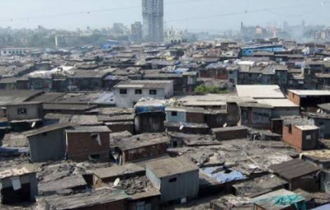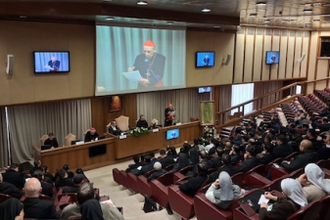India: Mumbai parish helps control Covid in largest slum in Asia

Dharavi slum, Mumbai
Source: Fides
The parish of Saint Anthony in the area of Dharavi, in the archdiocese of Bombay, is helping to stem the spread of the Covid-19 virus in Dharavi, one of the largest slums in the world, in the Mumbai area. The World Health Organization (WHO) has praised hygiene and nutrition projects introduced by the parish in the slum, which covers an area of 2.5 square kilometres and houses a population of 650,000.
People live there live in shacks and dilapidated buildings with narrow alleys and open sewers. WHO said the virus is currently under control thanks to the work of community groups, including parishioners from St Anthony's.
Parish priest Fr Christopher D Jeyakumar, said it was "a good result in the fight against coronavirus and in the work of social solidarity."
He said: "the people of the slum have found themselves experiencing very difficult times during the pandemic and the Church has mobilized to help, but the population has always lived with great dignity in conditions of poverty."
In Mumbai, the first case occurred on 11 March and the first Covid-19 case in Dharavi was reported on 1 April.
Fr Jeyakumar said: "In the initial phase there was fear that Dharavi would be a hotbed of coronavirus. The infection started in two areas that are located at opposite ends of the enormous slum. Usually, people from Mumbai, who intend to move abroad for work, temporarily stay in these two areas. They stay here until they find work, usually in some Gulf countries."
After the first case of Covid-19 was identified, the government prohibited the movement of people and any gathering. But physical distancing is almost impossible in Dharavi since people live in high density areas. For example, a family of five lives in a small one-room shack.
However, according to observers, in Dharavi, where basic civil services such as sanitation, water, waste collection are lacking, residents have developed some immunity to all types of infections present in society. The fact is that coronavirus has not spread like wildfire in Dharavi, as feared, and cases of infection are limited, although there has been great difficulty in following precautionary hygiene and spacing measures.
The lChurch in Mumbai has supported Fr Jeyakumar and his parish of about 5000 Catholics, in many ways. The Canossian nuns and several other communities have given food to the population of Dharavi.
"We have started to distribute aid, the help of the Centre for Social Action, which deals with the social and charitable service of the archdiocese of Bombay, without any discrimination of faith, ethnicity, caste", said Fr Jeyakumar.
"We cannot help only Catholics: in the past three months, people of all faiths have looked towards the Church and the people of Dharavi are grateful for the help they receive."
Today the population of Dharavi suffers from lack of work (most are day labourers or engaged in the so-called informal economy). They also suffers from the stigma of living in the slum.
"Wherever residents go to look for work, they are refused because they come from Dharavi," said Fr Jeyakumar. 'The welcome and support offered by the Church of St Anthony is extremely precious and crucial for survival."


















